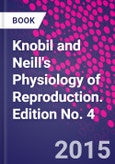The Fourth Edition of Knobil & Neill continues to serve as a reference aid for research, to provide the historical context to current research, and most importantly as an aid for graduate teaching on a broad range of topics in human and comparative reproduction. In the decade since the publication of the last edition, the study of reproductive physiology has undergone monumental changes. Chief among these advances are in the areas of stem cell development, signaling pathways, the role of inflammation in the regulatory processes in the various tissues, and the integration of new animal models which have led to a greater understanding of human disease. The new edition synthesizes all of this new information at the molecular, cellular, and organismal levels of organization and present modern physiology a more understandable and comparative context.
Table of Contents
Volume 1
Section 1: Gametes, Fertilization and Embryogenesis
Section 2: Gonadal Steroids, Pituitary and Hypothalamus
Section 3: Male Reproductive System
Section 4: Female Reproductive System
Volume 2
Section 5: Physiological Control Systems and Governing Gonadal Function
Section 6: Pregnancy and Lactation
Section 7: Reproductive Behavior and Its Control







